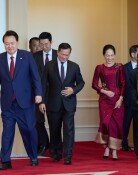[Opinion] An FTA Halo
The reactions of importers were immediate after the Korea-U.S. free trade agreement (KORUS FTA) negotiations were concluded.
According to the Foreign Trade Service of Korea Trade-Investment Promotion Agency (KOTRA), a U.S. company that imports polyester expects that the reduction in customs costs will lead to price fall and plans to increase its import of Korean-made goods by 25-50%.
Toray, a Japanese firm operating a film production plant in Gumi, Gyeongbuk, says that the company will, Invest an additional $400 million to expand the plant because there will be more chances to export to the U.S. through South Korea." Word is spreading that foreign buyers who focused on China are now re-examining the merits and demerits of importing from Korea and China.
The value of South Korea as a trade superpower is growing. Japan has shown its willingness to restart the Korea-Japan negotiations talks that have been suspended since 2004. Premier of China Wen Jiabao, who is visiting South Korea on April 10, also said, I hope that the studies on an FTA between Korea and China will be accelerated.
Next month marks the opening of negotiations with the EU. We are now able to present the KORUS FTA in our negotiations with the EU and say, "Refer to the KORUS FTA." Canada also hopes to open negotiations. With all these factors, there is no reason to envy India, which is receiving favorable proposals from the U.S. and China for economic and security-related cooperation talks. The halo effect of the FTA is already being felt.
800 potential exporters, far more than the expected quota of 250, sent entries for a fair KOTRA plans to hold on April 19 under the title, Manipulating the FTA to Find and Expand Markets in the U.S. The popularity is not as hot has the fever for subscriptions in the office-tel building in Songdo (the competitive rate of which was 4800:1), but it still is surprisingly high. Those export companies who painfully saw their market share in the U.S. market fall from 3.3% in 1995 to 2.5% in 2006 are now optimistic. We even worry whether sentiment is becoming too optimistic too quickly.
The spread of recognition of FTA benefits among regular people is also noticeable. Some go as far as to ask, Why arent the education and medical treatment sectors being opened?" Others wonder about the delayed establishments of law schools, asking, What are they waiting for when the law market will be opened in five years?" Many people think that changes should be made after the FTA. The time has come to open up the nation backed by our FTA with America.
Editorial Writer Hong Kwon-hee konihong@donga.com






